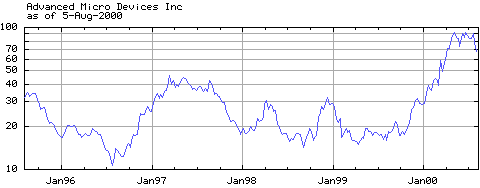Mercury Center heeft een artikeltje gepost over de zware daling van AMD's aandelenkoers, die binnen twee weken van ongeveer 90 naar 60 dollar is neer gestort. De AMD koers heeft een geschiedenis van sterke fluctuaties, meestal het gevolg van hoopgevende produktaankondigingen en daarop volgende deprimerende berichten over produktieproblemen. Dit keer lijkt de oorzaak een combinatie te zijn van onzekere, cachende aandeelhouders en een aankondiging van Carl Russo, CEO van Cisco Systems, over een verbeterde beschikbaarheid van Flash memories. Dit voor Cisco goede nieuws werd door de AMD aandeelhouders als minder wenselijk geïntepreteerd. Cisco is de grootste Flash klant van AMD en een betere beschikbaarheid van Flash geheugens zou de prijs onder druk kunnen zetten, wat negatieve gevolgen voor de winstcijfers van AMD kan hebben. AMD haalt een derde van z'n omzet uit de produktie van Flash geheugens:
After the Tuesday speech, AMD's stock went down at an even faster pace, reaching a low of $62.50 at Wednesday's close. Investors who remembered the heartbreak of the past were heading for the exits.That was when Sudeep Balain rode to the rescue. Balain, a technology analyst for Chase H&Q in San Francisco, has had AMD as a ``strong buy'' for a couple of months now. And Wednesday night, he began calling around to reporters and investors, suggesting that the market had misinterpreted Russo.
``We don't think the overall market for flash memory has improved any in the recent past,'' Balain said. ``Our understanding is that Cisco has gone back to AMD in the last three or four weeks, looking for more product. And AMD has obliged.''
[...] Both Cisco and AMD have tried to clarify the Russo statement, pointing out that they continue to see a tight market overall for flash memory. ``Every flash memory unit we can make, we have a customer for through 2001,'' says John Greenagel, AMD's director of strategic communications. ``And prices are firm.''
[...] There are some encouraging signs that this AMD is different from the old AMD. First, the gross margins -- how much the company makes on each sale above manufacturing costs -- has increased from 44 to 47 percent, a sign of increased efficiency. Second, AMD's debt has gone down. It recently agreed to repurchase a group of 11 percent notes, and it made use of cheap loans from the German government to build its Dresden plant. [break] AMD heeft ondertussen aan haar werknemers een memo gestuurd waarin duidelijk wordt gemaakt dat de zaken nog steeds soepel lopen. In het vierde kwartaal van dit jaar verwacht AMD 7,2 miljoen Athlon/Duron processors te leveren, een verdubbeling ten opzichte van het derde kwartaal. Dresden loopt op schema en verder benadrukt AMD haar positie van technologisch leider in de Flash markt. Onderstaande info komt uit deze ZDNet talk back posting: [/break] A message to AMD employees: You probably have noticed volatility in AMD's stock during the past couple of weeks. While AMD does not speculate on the market, it is important to reiterate to AMD employees the strength of AMD's business.
Last Wednesday, we reiterated our guidance to the financial community in a news release which contained the following highlights:
Additionally, Walid Magribi, Memory Group vice president, reiterated AMD's solid position in the flash market in a memo to AMD sales employees. Highlights include:
- We expect to report record sales in the September quarter based on continued strong demand for our flash memory and PC processor products.
- We plan to meet our goal of doubling shipments of seventh-generation PC processor to 3.6 million units in the third quarter and again doubling shipments to 7.2 million in Q4.
- Volume shipments of 1.1 gigahertz AMD Athlon processors will commence this quarter with higher speed devices to follow in Q4.
- Total PC processor shipments including sixth and seventh generations could approach 7 million units this quarter and 9 million units in Q4.
- Fab 30 continues to make excellent progress in ramping production and is expected to contribute significantly to sales in the second half of this year.
Lastly, in response to concern that some informal comments made by Cisco concerning global supply issues relating to flash memory products may have been misinterpreted, Cisco has said they believe that the demand for communications-related components remains robust and as a result, overall component supply constraints for our industry, including flash memory, will continue.
- Demand from our top 20 customers alone is two times what we can supply for the next two years.
- Cellular telephone giant Nokia embraces our technology and acknowledges our leadership.
- We are very well diversified. We supply less than 40% of our capacity to the cellular market and almost none to the top 3 today. We have become the dominant supplier of Flash for internetworking,telecommunications infrastructure, automotive, GPS, paging, handheld PC's,and DSL modems. Walid concluded, "The key to our future is staying close to our customers and leading them through this shortage. Maintaining our accounts with a combination of customer service, a broad product portfolio, and new innovative products will position us for the long term.
 |

